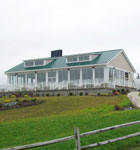At a Glance
Locations
Auburn, AL
Founded
1999
Employees
16
Specialty
Custom-home construction
Annual Sales
$15 million
At 19 years old, most college students are still narrowing down their field of study. But in 1999, while still a student in Auburn University’s building science program, Michael Dilworth began his construction career by building his first home.
Dilworth was expecting to work as a project manager for a local builder, but the builder failed to come through on his offer. So, out of determination, Dilworth set out to build a house of his own. As the years went by, his motivations changed, and he hoped to become one of the best builders in Auburn, Alabama. Now, 10 years after its founding, Dilworth Development, Inc. continues to build client-centered custom homes, but it also has its eye on opportunities for innovation.
Diversification is behind the company’s continued success in the recession. While the core of Dilworth Development is building custom homes, it has also expanded outside that model. Subservices of the business include commercial construction, development, and interior design. The firm has created desirable neighborhoods by offering all the necessary services within one development company—and it has been able to improve client satisfaction and increase its revenue and profit in the process.
Dilworth Development concentrates on a range of custom-home sizes and price ranges. “We are trying to prevent homebuilding from becoming an assembly line,” Dilworth says. “We don’t fit a mold, and we don’t ask our clients to fit a mold either.”

The company is dedicated to servicing its clients, whether it is satisfying something they need or going above and beyond. Dilworth says the first step of every custom project is having a conversation with the clients—understanding where they want to live, what they want their home to look like, and how long they expect to be there.
“One of our core principles is to evaluate those factors so we can maximize what we do for that client,” Dilworth says. “Along with that comes subprinciples like communication, honesty, and responsiveness. It is good for our long-term business, but it is also a good thing to do.”
Another best practice is to maximize the client’s dollar. Based on a project’s budget, Dilworth Development researches the best materials and allocates building funds to where they will provide the biggest benefit in terms of resale and client satisfaction. “The advantage for us is we are able to service all clients and be diverse,” Dilworth says. “From a business standpoint, we’ve noticed the market is cyclical. If one market is slow for some reason, we have something else to fall back on.”

While many companies strive for continued growth, Dilworth Development is comfortable at the moment, averaging $15 million a year in annual revenue. In 2012, the firm is concentrating on improving internal processes by conducting a detailed analysis to determine which tasks should be regimented or robotic and which need to be flexible to fit the development firm’s vision of servicing its clients better than all others.
Dilworth Development currently focuses on innovation, responsiveness, and efficiency. “We are now measuring ourselves against business innovators like Apple,” Dilworth says. “I don’t want to be as big as Apple, but I want to be innovative, I want to be forward-thinking.” It is by doing this work to perfect its model of building homes that Dilworth Development will make the process run smoother and faster. “From there,” Dilworth says, “if we are able to accomplish this in a unique way, thinking outside the box, then the next step would be to take this small-town builder of 30–40 homes a year and replicate that in a new location.” ABQ



